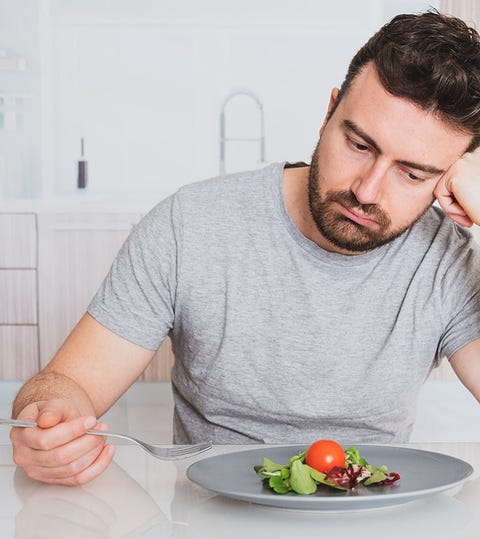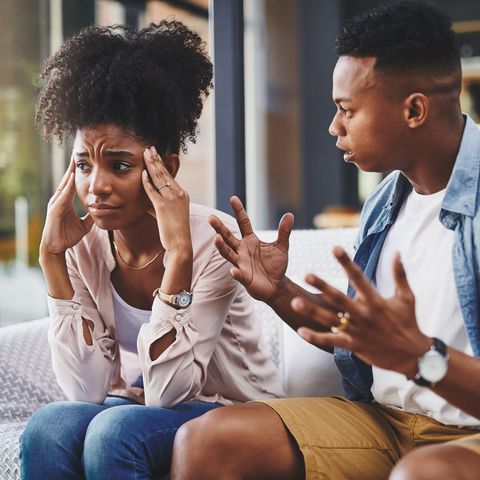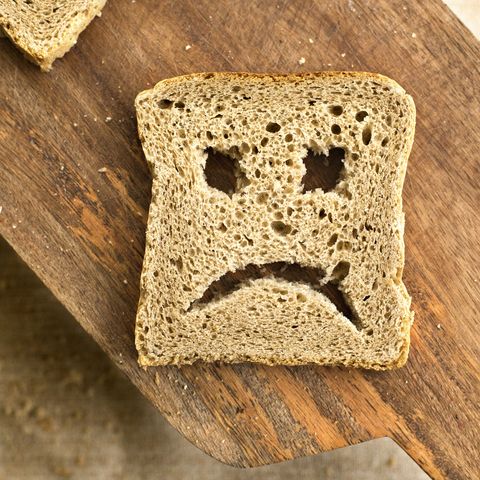10 Weird Side Effects of Extreme Weight Loss
There are countless benefits to dropping pounds if you’re overweight or obese. You’ll have more energy. You’ll look and feel better in clothes. You’ll slash your risk of developing diabetes, depression, sleep apnea, impotence, back pain, cardiovascular disease, and some types of cancer.
But every so often, losing a large amount of weight comes with some strange side effects, too, says Tricia Leahey, Ph.D., professor of psychiatry at Brown University’s Warren Alpert Medical School.
While the pros of slimming down outweigh the cons, the following potential consequences may stall your progress or—even worse—discourage you from reaching your end goal.
Read on to prepare yourself so you can stay on track.
The Blues

Getty Images
You should feel elated with each lost pound, so why do you feel so unhappy? Dropping weight may actually increase your risk for depression, according to a study from University College London.
Researchers observed nearly 2,000 overweight adults for four years. Subjects who lost at least 5 percent of their body weight were 78 percent more likely to report depression than those who didn’t move the needle on the scale.
“Often we have really high hopes for weight loss,” says Alexis Conason, Psy.D., a clinical psychologist based in New York. “When we lose weight but find ourselves still struggling with the same problems, we may feel frustrated or discouraged.”
Your move: Get plenty of sleep and eat healthy foods when you’re hungry to reduce your risk for depression, Conason says. Being well nourished and rested will help give you the resilience to cope with challenges.
If you become totally preoccupied with weight loss—such as abandoning plans with friends to go to the gym or obsessively counting calories at every meal—see a psychologist for help.
Ditto if you experience signs of depression: Feeling pervasively sad, isolating yourself from others, and losing interest in things you usually enjoy, Conason says.
Loose Skin
Sadly, melting flab doesn’t automatically come with tight, taught abs. If you lose a lot of weight, you may wind up with sagging folds of excess skin.
“Skin stretches over time to accommodate extra body mass,” says Adonis Maiquez, M.D., director of wellness and regenerative medicine at the Miami Institute for Age Management and Intervention.
When the fat is gone, your skin may not have enough elasticity to shrink back down to your current body shape, Dr. Maiquez says.
The amount of loose skin you wind up with depends on how old you are, how quickly you dropped weight, and how often you’ve lost and gained weight in the past, he says.
Your move: In cases of extreme weight loss, plastic surgery may be the only way to get rid of your extra skin, says Holly Wyatt, M.D., professor of medicine at the University of Colorado.
But if you have just a little sagging, build muscle to make your skin look more taut, Dr. Wyatt suggests.
Lost Love

Getty Images
Teaming up with your partner to lose weight can increase your chances of success. But if they’re not on board, your relationship may suffer, according to a recent study from North Carolina State University.
Researchers surveyed couples in which one partner had lost weight. The one-sided lifestyle change often led to arguments and hard feelings between partners, says study author Lynsey Kluever Romo, Ph.D. Be aware that weight loss may leave your spouse feeling neglected, guilty, or jealous.
Your move: Explain why losing weight is important to you. If she understands your motives, she’ll be more likely to support you, Conason says. Don’t ask her to adhere to your gym plan, though. Your insistence may be misconstrued for nagging.
Stomach Pain
Some people who lose weight fast develop gallstones—hard lumps that form in your gallbladder, Dr. Wyatt says.
If you cut down on fat in your diet, your gallbladder doesn’t contract as frequently, allowing bile to become concentrated in the organ, which leads to the formation of stones, she explains.
Your move: Include fat in your daily diet to keep your gallbladder functioning properly, Dr. Wyatt says. Fat is often viewed as a dietary demon, but studies show that the nutrient doesn’t inflate your belly—too many calories do.
Fat may also make your meals more enjoyable, as long you keep portions in check. See your doctor if you’re experiencing gallstone symptoms like intense stomach pain, nausea, and fever.
Phantom Cravings

Getty Images
Maybe it’s a pint of Cherry Garcia. Maybe it’s a bag of Nacho Cheese Doritos. Whatever your craving is for, it’s probably not going to be for kale.
Look, it’s fine to give in to temptation—in fact most dietitians will tell you that it’s a healthful way to manage a good diet long-term.
But the best solution for avoiding cravings is to focus on foods that keep you feeling full longer. That means “focusing on high fiber, moderate protein and healthy fats,” says Shelby Cox, a registered dietitian nutritionist and director of the Kendall Reagan Nutrition Center at Colorado State University.
Your move: Fill up on at least 30 grams of protein and 10 grams of fiber at each meal. These amounts will help you increase satiety, also known as your fullness between meals.
Muscle Loss
When you lose weight by changing what you eat, “two thirds of the weight you lose is fat, and about one third is muscle,” says William Samuel Yancy, M.D., director of the Duke Diet and Fitness Center and associate professor of medicine at Duke University.
Not only can that leave your skin a little loose, but loss of calorie-burning muscle doesn’t help you keep going in your weight loss efforts as quickly.
Your move: “If you maintain a good protein intake and do strength exercises as you lose weight, you can shift that ratio a bit so there’s less muscle loss,” Dr. Yancy says. If you’ve been doing cardio exclusively, make an effort to increase the amount of strength training you do. You can get muscle gains even with body-weight exercises, like this set for abs (no weights required), or get started in the gym with this total-body workout.
What’s “a good protein intake”? You don’t have to go crazy on it, just aim for about 30 grams at every meal. Most people load up on protein at dinner and have very little for breakfast. Try spreading it out a bit by serving up something like eggs for breakfast (21 grams of protein for three), or maybe even leftovers from last night’s dinner? Just be aware that yogurt isn’t a protein motherlode: it only has about 9 grams per cup, but that’s still better than what you’d get in toast (usually barely 3 grams). Protein can also be an extra weapon in helping you continue to lose weight. Find out exactly how protein can help you with weight and muscle.
Powerful Hunger
Sure, part of your ferocious appetite may be due to the fact that you’re simply eating fewer calories, but it might also be because your metabolism hasn’t yet adjusted to your new diet. Or, maybe your calorie intake hasn’t adjusted to your new workout regimen. Whatever the case, know that this is normal.
Your move: Hit the gym (or hiking trail, or walking path, or swimming pool, or…). Sticking to a workout routine can help strengthen a region of your brain called the “dorsolateral prefrontal cortex,” which helps consider long-term consequences to short-term decisions. So, the more you engage in physical exercise, the more you may reinforce your mental fortitude too.
The Dreaded “Plateau”
Maybe you’ve lost 10 pounds and it was easy. And then you lost another 10 pounds at that, too, was easier then you thought. But then you stall and those next 10 pounds are more stubborn than the cauliflower rice that sticks to the bottom of the pot.
People call this fat-loss flatline the “plateau,” but it’s also common and not as difficult to overcome as you might think. And, actually, it may be your body’s way of signaling to you that it’s time to mix things up.
Your move: Change up your gym routine. It can be easy to fall into an “Exercise A, Exercise B, Exercise C” regimen—especially if it’s worked for you in the early stages of your weight loss. Don’t abandon those exercises altogether. Instead add a few new moves during the tail end of your usual workout to throw your body a changeup.
Crankiness

Getty Images
Okay, you’ve dropped a few pants sizes, but is this all worth it if you’re snapping at your partner, children, and beloved family pet? No, your soul isn’t growing meaner as you grow meaner.
Blame a lack of carbohydrates. Most diets have you remove simple (or processed) carbs in order to help you cut calories. But cutting too many carbs can deplete your brain of the vital energy stores it needs to function and generally be a nice human being.
Your move: Work carbs gradually back into your diet. And focus on more “complex” (or unprocessed) carbs, such as fruits and vegetables. These foods contain fiber, which will help fill you up, along with antioxidants and plenty of other beneficial nutrients.
Sudden Urges to Remove Your Shirt
You look good. You’re proud of it. You want to flaunt it.
Your move: Unless you’re at a restaurant, a grocery store, driving, at work, or in any other situation where it would be socially inappropriate to go topless, go for it. You’ve earned it.
Source: Read Full Article
